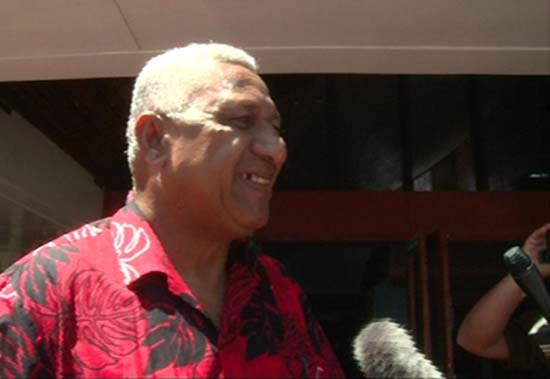
AUCKLAND (RNZI / Pacific Media Watch / Café Pacific / Fiji Times): Many eyes are on Fiji's former military dictator and now elected prime minister, Voreqe Bainimarama, with hopes that his election victory would soften his stance towards the media and civil society.
The final election results for Fiji were declared at the weekend with Bainimarama's party, Fiji First, winning just over 59 percent of the vote.
The run up to the election was characterised by media complaints about the military decrees which restrict their reporting.
Just eight days before the election, two women journalists – Vosita Kotowasawasa of the Fiji Broadcasting Corporation (FBC) and Jyoti Pratibha of the Fiji Sun newspaper – received death threats over their previous day’s coverage of the cancellation of a live TV debate between the leading contenders for the post of prime minister. The origin of the threatening calls is still being traced.
"The hope is that Bainimarama’s authoritarian streak will gradually mellow and he will come to recognas an elected leader the critical importance of a civil society discourse with a strong non-government organisation sector and an independent Fourth Estate," wrote Professor David Robie, director of the Pacific Media Centre, on his Café Pacific blog.
Politician and economist Professor Biman Prasad, whose National Federation Party got three seats in the election said in a campaign speech that "the media decree with its heavy fines and penalties make it impossible for the country’s journalists to cover issues openly and without fear. It makes it impossible for us to project our messages to our people".
New Zealand-based Fijian Pacific studies academic Dr Steven Ratuva has told RNZI that Voreqe Bainimarama's landslide victory in the election is mainly due to the prime minister's appeal to all ethnicities.
Bainimarama won about 58 percent of the indigenous Fijian vote and about 70 percent of the Indo-Fijian vote.
Dr Ratuva says that by promising political security after a spate of coups, Bainimarama also appealed to urban Indo-Fijian voters.
However, with a small opposition made up of SODELPA with 15 seats, and the National Federation Party, with three seats; it may be difficult to hold Bainimarama accountable, Ratuva told RNZI:
"It's going to be a very unbalanced Parliament in terms of accountability and secondly in terms of complacency for the government itself. You're bound to have parliamentary dynamics which will be almost totalitarian in nature, although of course it's legitimate, it's through election."
Professor Jon Fraenkel of Wellington's Victoria University said that Bainimarama had "gone to great lengths to allay indigenous voters' concerns" by setting up road building projects, free bus fares for school children and subsidised primary education.
"Many ethnic Fijians see Rear Admiral (Ret) Bainimarama as an indigenous leader, who has succeeded in dominating the national stage where others failed," Fraenkel wrote in the Fiji Times newspaper.
This work is licensed under a Creative Commons Attribution-NonCommercial 3.0 New Zealand Licence.




